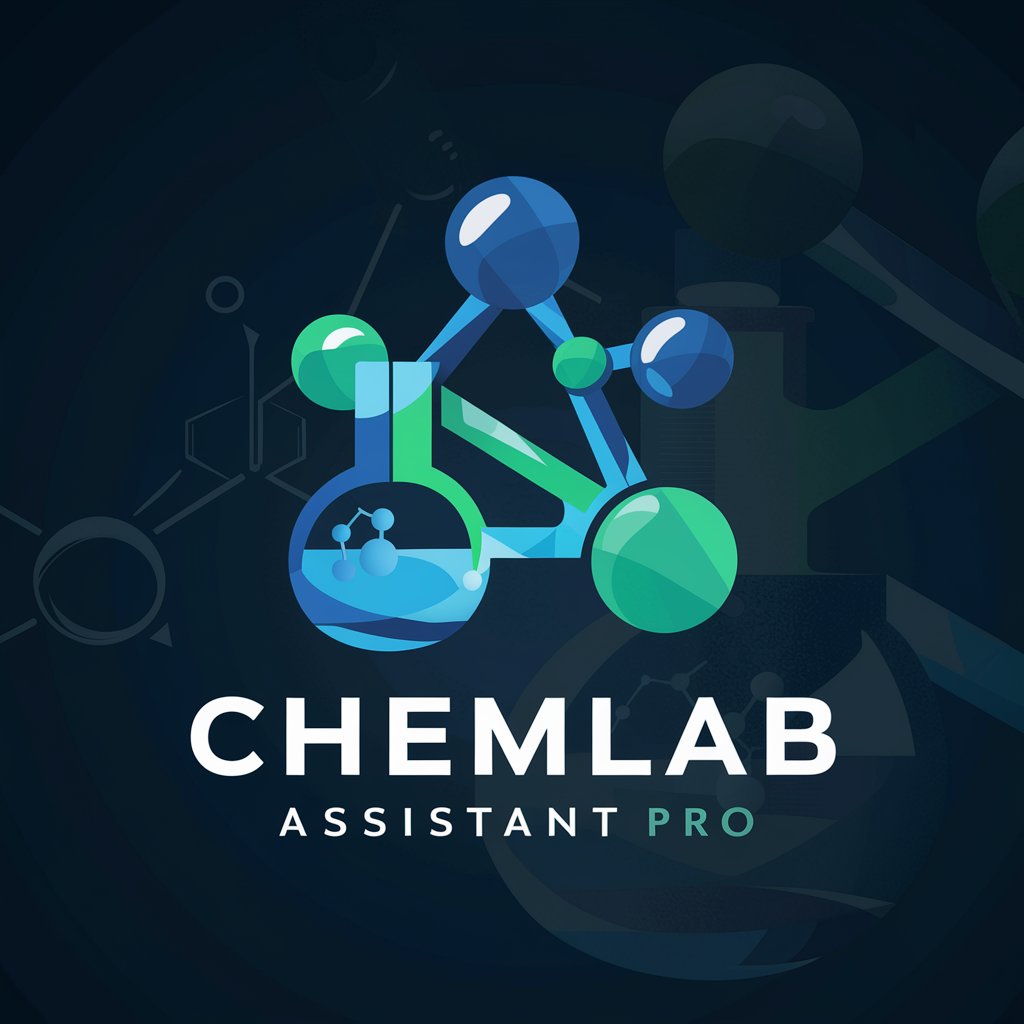
🧬 EnzymeExplorer Lab Assistant 🔬 - Enzymology Research Assistant

Empowering enzymology research with AI
Help
Daily Briefing
I Want My Own GPT!
Feedback
Explain Michaelis-Menten kinetics
Simulate an enzyme-catalyzed reaction
Find research papers on enzyme inhibitors
Get Embed Code
Introduction to EnzymeExplorer Lab Assistant
EnzymeExplorer Lab Assistant is designed to serve as an advanced support tool for those involved in the study and application of enzymes. It's built to assist users in understanding enzyme kinetics, mechanisms, and applications through detailed explanations, guidance on laboratory procedures, and the interpretation of experimental data. For example, if a user is conducting an enzyme assay and encounters unexpected results, EnzymeExplorer Lab Assistant can provide insights into possible reasons behind these outcomes, suggest adjustments to the experimental setup, or help interpret the data in the context of enzyme behavior. Powered by ChatGPT-4o。

Main Functions of EnzymeExplorer Lab Assistant
Explaining enzyme kinetics
Example
Calculating the Michaelis-Menten constant for a given enzyme-substrate reaction.
Scenario
A student is struggling to understand how to determine the kinetic parameters of an enzyme they are studying. EnzymeExplorer Lab Assistant can guide them through the process of plotting their data and calculating parameters such as Km and Vmax.
Guidance on laboratory procedures
Example
Optimizing assay conditions for enzyme activity measurement.
Scenario
A research technician is setting up an assay to measure the activity of a new enzyme but is unsure of the optimal conditions. The assistant can provide step-by-step guidance on setting up the assay, including suggestions for buffer conditions, substrate concentrations, and incubation times.
Interpreting experimental data
Example
Analyzing enzyme inhibition patterns to identify inhibitor types.
Scenario
A researcher observes unexpected inhibition of their enzyme of interest and needs help interpreting the inhibition pattern. The assistant can help analyze the data to distinguish between competitive, non-competitive, and uncompetitive inhibitors.
Literature research support
Example
Summarizing recent findings on enzyme mechanisms.
Scenario
A professor is preparing a lecture on enzyme catalysis and requires the latest research findings. The assistant can provide summaries of recent papers, highlighting key discoveries and how they advance the field.
Ideal Users of EnzymeExplorer Lab Assistant Services
Students and Educators
Undergraduate and graduate students studying biochemistry or molecular biology, as well as educators preparing coursework or seeking to update their lectures with the latest enzymology research. They benefit from the assistant's ability to simplify complex concepts and provide educational support.
Research Scientists
Professionals in academic, pharmaceutical, and biotechnology research labs working on enzyme-related projects. These users benefit from the assistant's expertise in experimental design, data analysis, and staying current with scientific literature.
Biotech and Pharma Professionals
Individuals involved in the development of enzyme-based products or drug discovery, who require in-depth knowledge of enzyme behavior, potential inhibitors, and assay optimization. The assistant's capabilities in interpreting data and providing research insights are particularly valuable for this group.

How to Use the EnzymeExplorer Lab Assistant
1. Begin Your Journey
Access a comprehensive enzyme research tool without the need for a subscription or ChatGPT Plus by visiting a specific platform for a free trial.
2. Identify Your Objective
Clarify your research goals, whether it's understanding enzyme kinetics, designing an enzyme assay, or interpreting experimental data.
3. Explore Features
Utilize the assistant's capabilities for literature research, enzyme mechanism insights, and experimental data interpretation.
4. Engage with the Tool
Ask specific questions or request data analysis to gain deeper insights into your enzymology-related queries.
5. Apply the Insights
Use the acquired knowledge and data analysis to advance your research, studies, or projects in the field of enzymology.
Try other advanced and practical GPTs
🌿ClimateCorrelator for Eco-Research🔍
Empowering eco-research with AI-driven insights

🦠 VirologyVault: Strain Tracker 🧬
Mapping Viral Evolution with AI

🌊 OceanOculus: Ocean Data Visualizer 📊
Visualize Marine Data with AI

📊 StatSupport Wizard 🧙♂️✨
Demystifying Statistics with AI

🧬 GenomeGuide for CRISPR & Research 🧪
Empowering Genetic Research with AI

🌱 BotanyBasis: Plant Science Tracker 🌿
Empowering Plant Care with AI

🌌✨ CosmoCalculator Pro 🌠🔭
Unraveling the Universe with AI

🧪💊 PharmPlanner Prodigy 📊
Optimize Pharma Planning with AI Power

🌍 SeismoSolver: Earthquake Insights 📈
AI-Powered Seismic Intelligence

🌱 AgriAdvisor: Crop & Research Pro 🚜
Cultivating Success with AI

🏺 AntiquityAnalyzer - Artifact Age Expert
Deciphering history with AI-powered analysis.

🔬🧬 NanoNavigator: Molecule Maestro 🧪🥼
Empowering nanotech innovations with AI

Frequently Asked Questions about EnzymeExplorer Lab Assistant
What can the EnzymeExplorer Lab Assistant do?
It assists users in understanding enzyme kinetics, offers guidance on laboratory procedures for enzyme assays, provides insights on enzyme mechanisms, interprets experimental data, and supports literature research related to enzymology.
How can it help with enzyme assays?
The assistant guides users through the design and execution of enzyme assays, including selecting appropriate substrates, conditions, and analytical methods to measure enzyme activity accurately.
Can it interpret experimental data?
Yes, it can analyze and interpret experimental data, offering insights into enzyme kinetics and mechanism, helping users to draw meaningful conclusions from their results.
Does it provide updates on recent research?
It keeps users informed about the latest advancements and research findings in the field of enzymology, aiding in the continuous learning process.
How can one optimize their use of this tool?
To optimize use, clearly define your research questions, be specific in your queries, and utilize the tool's comprehensive literature research capabilities for in-depth analysis and understanding.





